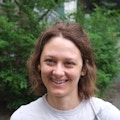Tanja Bosak, Ph.D.
Professor of Geobiology, Program in Geology, Geochemistry and Geobiology, Massachusetts Institute of TechnologyTanja Bosak’s website
SCOL Project: Signatures of Biological and Environmental Co-evolution on the Early Earth
Sedimentary rocks from the early Earth record interactions between early microbes and their physical and chemical environments. Signs of even older life or prebiotic chemistry may be present in past habitable environments on Mars that will be explored by the upcoming Mars 2020 mission. The proposed work will enable the interpretation of these sedimentary records by exploring the formation and preservation of mineral, morphological and isotopic biosignatures in the presence of microbial metabolisms and chemical conditions hypothesized for the Earth before the rise of oxygen and for early Mars. Experiments will target mechanisms by which different microbes influence the formation of manganese oxides or carbonate minerals such as dolomite, as well as the potential of microbial biofilms, pigments and different types of photosynthetic and nonphotosynthetic organisms to become preserved in silica. Experiments will also explore minerals and other preservable biosignatures that can be produced by methanogenic and iron-reducing microbial communities in basalt- and hydrogen-rich aqueous environments analogous to those on Earth and early Mars. Minerals, distributions of elements and organic matter, and stable isotope ratios in microbially produced structures and minerals will be investigated at a range of scales, from visible to those smaller than a microbial cell. Insights from the laboratory will be used to reconstruct microbial processes from geologic samples or inform the search for biosignatures on Mars.
Bio:
Tanja Bosak was born in Croatia and graduated from Zagreb University with a degree in geophysics. After a summer of research at the Jet Propulsion Laboratory, she moved to the California Institute of Technology in Pasadena, where she studied signatures of microbial processes in ancient sedimentary rocks and earned a Ph.D. in geobiology. She spent two years at Harvard University as a Microbial Initiative Postdoctoral Fellow, joined the Department of Earth, Atmospheric and Planetary Sciences at the Massachusetts Institute of Technology in 2007 and is now a professor of geobiology and the group leader of the Program in Geology, Geochemistry and Geobiology at MIT.
Bosak’s work integrates microbiology, sedimentology and stable isotope geochemistry into experimental geobiology to ask how microbial processes leave chemical, mineral and morphological signals in sedimentary rocks. Her lab uses this approach to explore modern biogeochemical and sedimentological processes, interpret the coevolution of life and the environment during the first 80% of Earth’s history, and look for signs of past life on Mars. For this work, and her work with graduate students and undergraduates, Bosak received the Subaru Outstanding Woman in Science award from the Geological Society of America (2007), the James B. Macelwane Medal from the American Geophysical Union (2011), the Edgerton Award for young faculty at MIT (2012), the Undergraduate Research Opportunities for Undergraduates Mentor of the Year award from MIT (2012) and the Award for Outstanding Contributions and Dedication to Geobiology and Geomicrobiology from the Geobiology and Geomicrobiology Division of the Geological Society of America. Bosak is a fellow of the American Geophysical Union (2011), a participating scientist and a member of the Project Science Group on Mars 2020 rover mission.